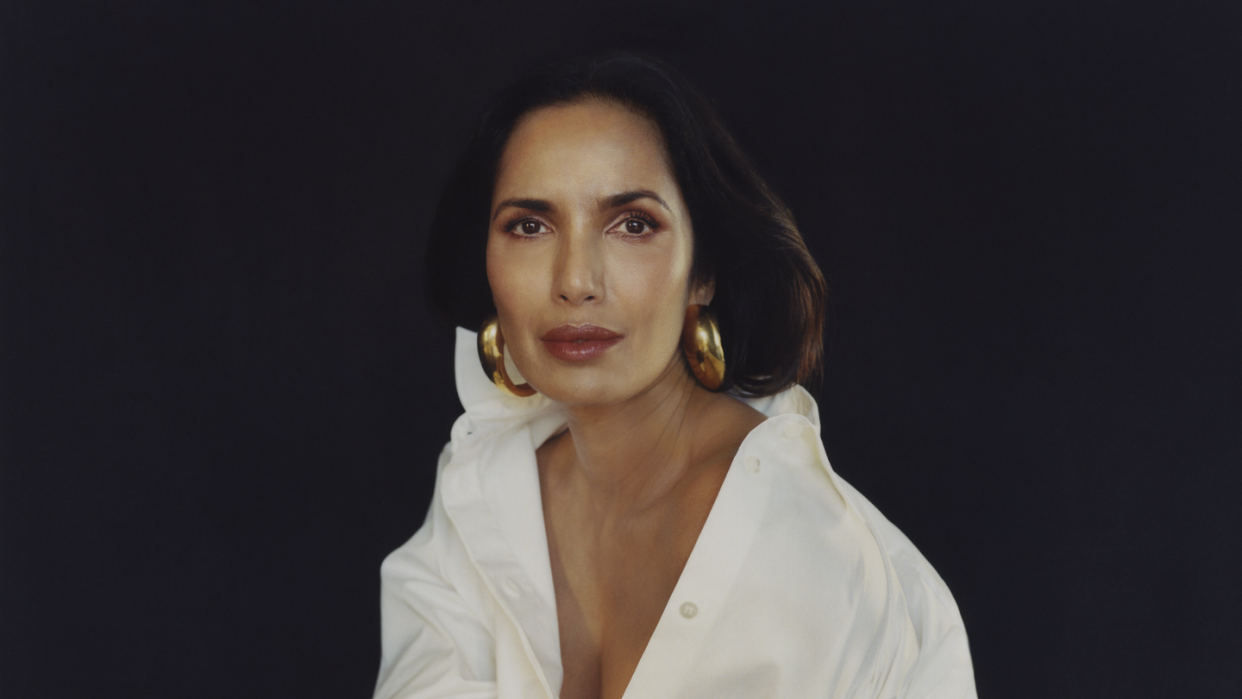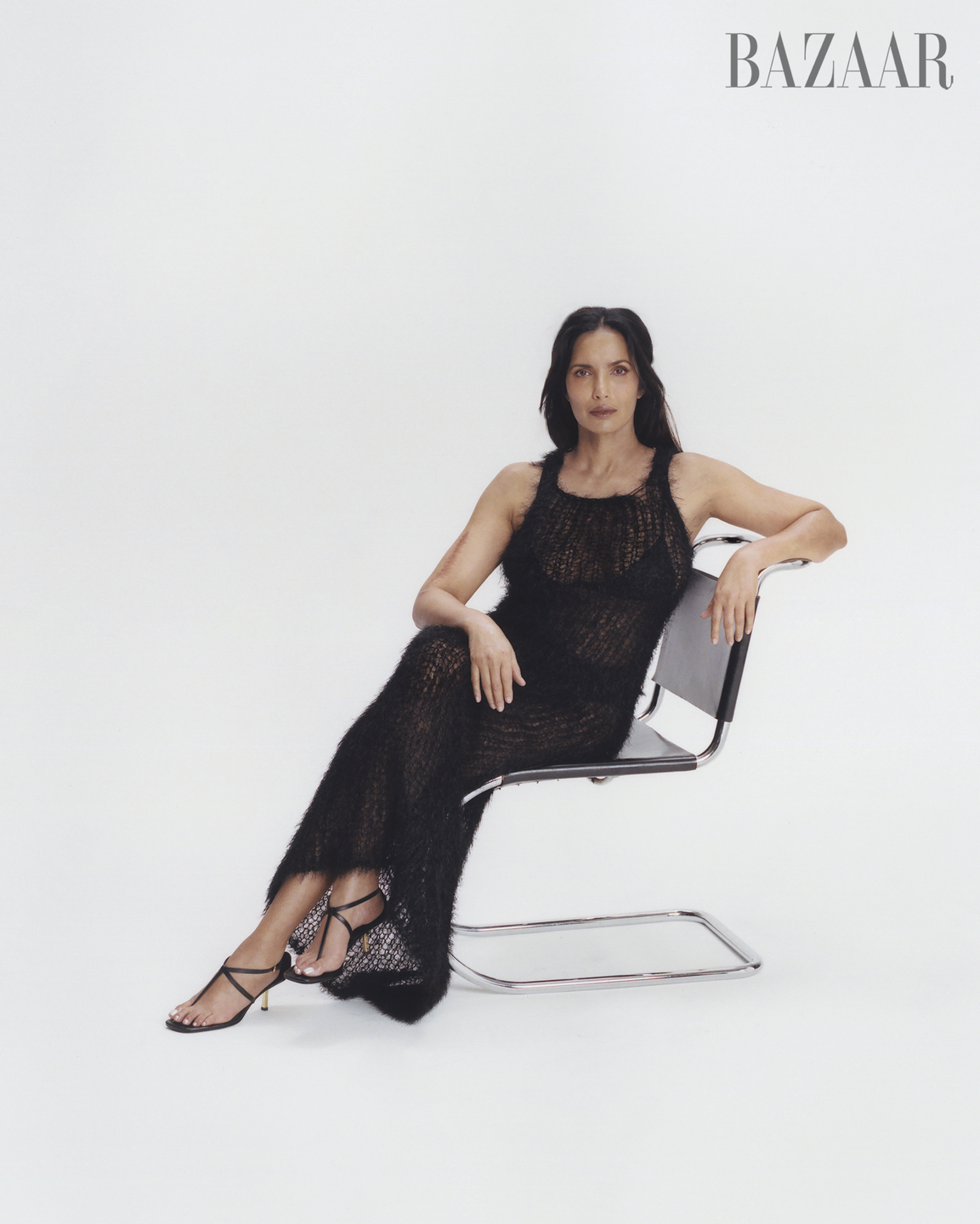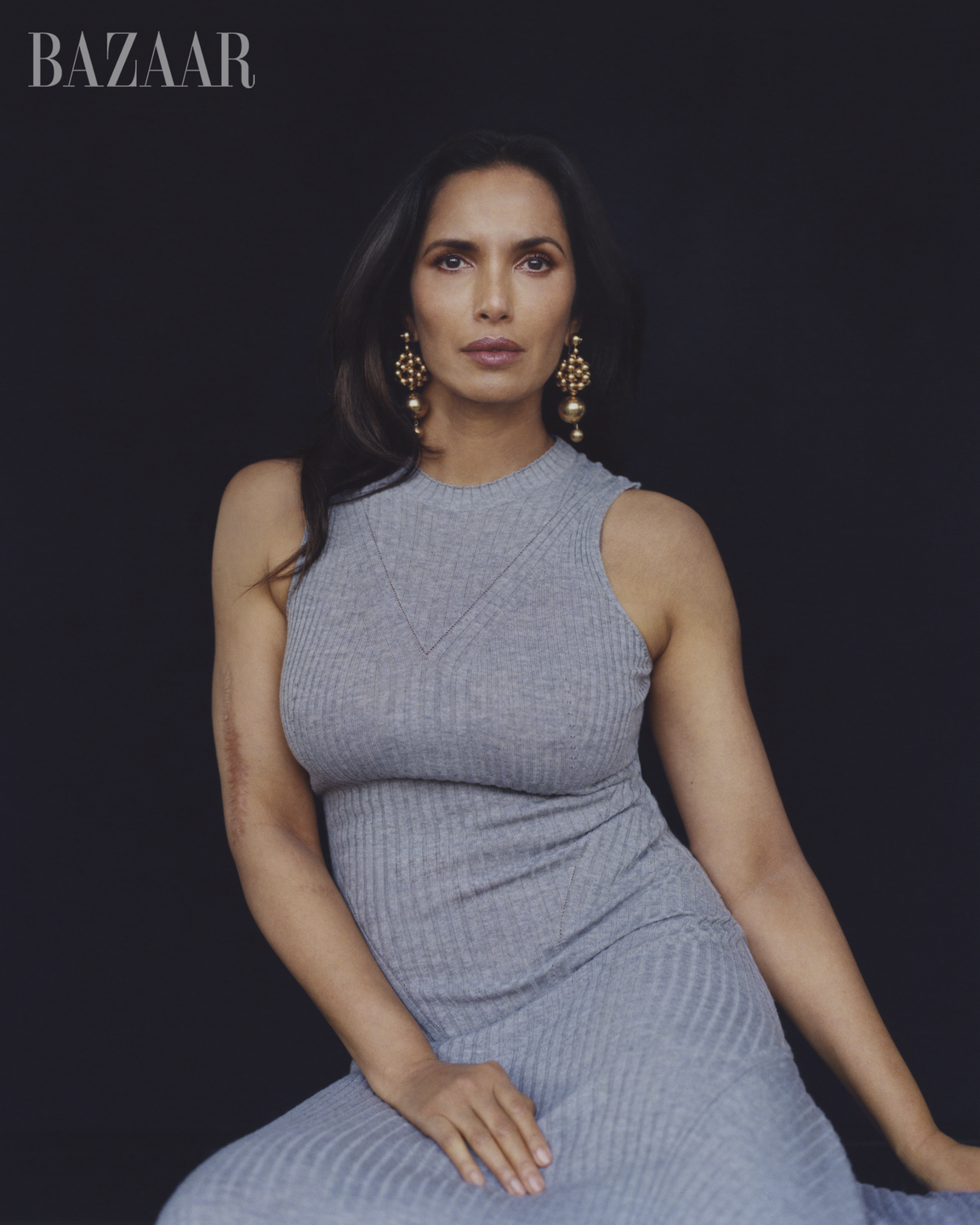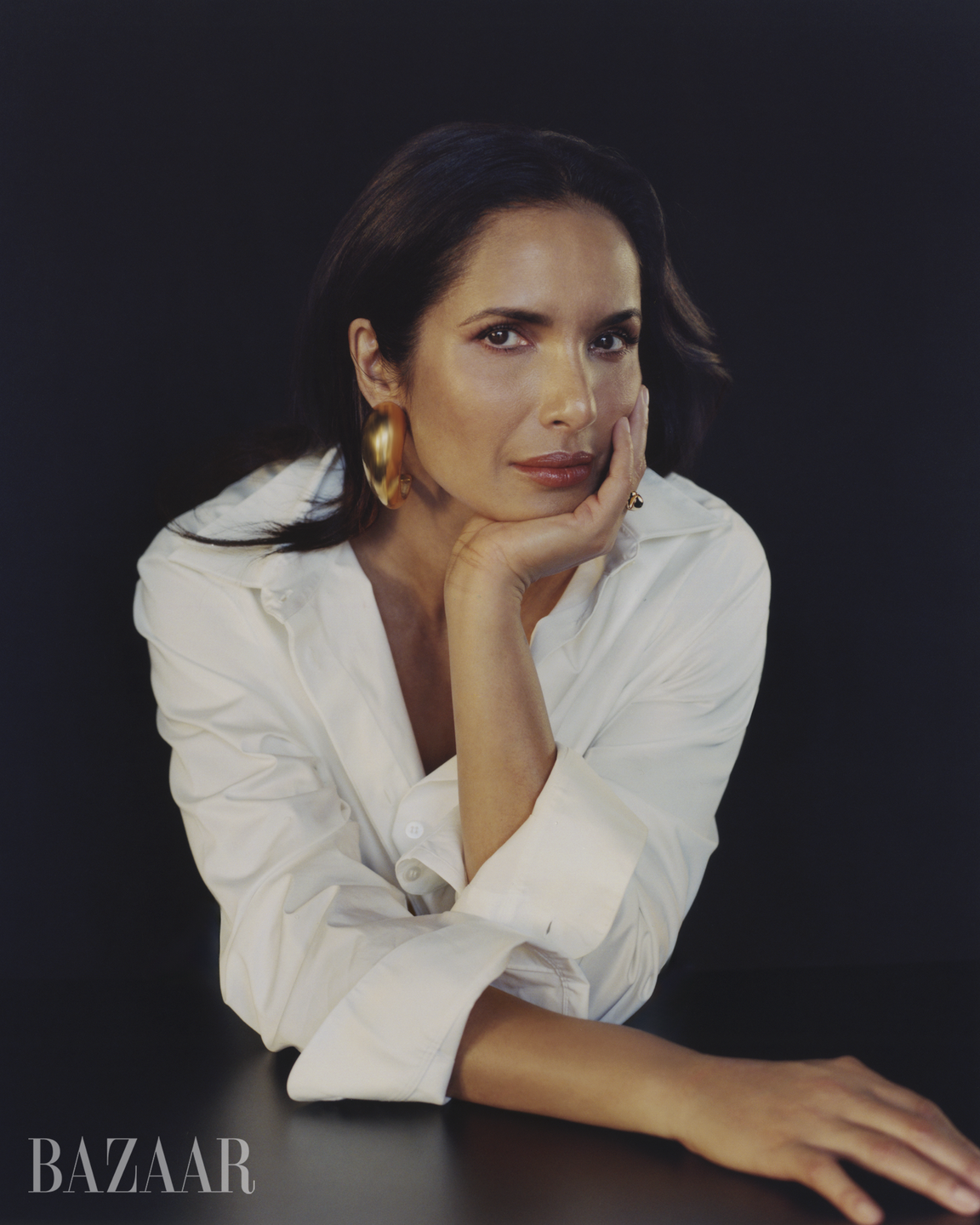What Padma Lakshmi Wants

"Hearst Magazines and Yahoo may earn commission or revenue on some items through these links."
According to Padma Lakshmi, there are several reasons why she left Top Chef.
It is a cold, wintry morning in New York, and I’m sitting across from Lakshmi at the Mercer hotel in SoHo as she explains her thinking. She is dressed casually in jeans and a long-sleeve shirt—but she had arrived bundled in a cropped fuchsia faux-fur Tom Ford jacket, a recent present to herself. We order breakfast. For her, two eggs poached, with a side of avocado and sourdough toast.
“It was really taking a toll on me physically to digest that much food in a day,” Lakshmi explains in that unmistakable voice, low and mellifluous, like honey sliding down a spoon. After 19 seasons, she had reached her limit. Each year, she gained 10 to 15 pounds within six weeks. She started taping the show in 2006, when she was 35. Now she is 53. (“Nobody tells you that about perimenopause,” she says. “Your tits get huge.”) Her metabolism isn’t what it used to be. “I live in the fucking gym,” she says. Making Top Chef meant weeks at a time away from home. She had spent every birthday in recent memory on set. Lakshmi also has a 14-year-old daughter, Krishna, or #LittleHands, as she affectionately calls her on Instagram, and is acutely aware that she will soon, in the not-so-distant future, become an empty nester. And so, while taping in London the summer before last, she made the call.
“I think I knew by a very precise moment,” she says.
It wasn’t that Lakshmi wasn’t grateful. After all, Top Chef made her a household name, bringing her into the homes of millions of viewers and garnering the support of loyal fans. The show was a phenomenon, offering a glimpse inside the hierarchical and often masochistic world of being a chef. It took her to countless cities and earned her and her crew and castmates dozens of Emmy nominations. Lakshmi had a knack as a judge, with the ability to isolate unusual flavors and ingredients, banter with the other judges and celebrity guests, and offer a firm but empathetic guiding hand to the contestants. She even, for one episode in 2016, officiated a mass wedding for 25 same-sex couples. Before Top Chef, she was often identified in the media as a former model and the wife of the writer Salman Rushdie. Top Chef changed all of that. “A lot of my fans now don’t even know I was married to him,” Lakshmi says.

Then there is Taste the Nation With Padma Lakshmi, her new show on Hulu, with only two seasons under its belt; she is anxiously waiting to hear if it will be renewed for a third. If Top Chef captured the rigors and preoccupations of Western fine dining, then Taste the Nation reflects something else entirely. In it, Lakshmi travels to cities across the United States, spending time in various communities, often immigrant or Indigenous, and showcases their food and traditions. In one episode, she samples the halal food of Dearborn, Michigan, during Ramadan. In another, she explores the origins of chop suey (a dish that doesn’t exist in Asia) with Chinese American chefs in San Francisco. There’s a touch of Anthony Bourdain’s swashbuckling sense of adventure mixed with the more serious documentary sensibility of a PBS show. Its success—it, too, has earned Lakshmi an Emmy nomination—is part of a radical shift in the media’s coverage of the food world, one where we are finally acknowledging that great food can exist outside the confines of culinary epicenters codified by European chefs more than a century ago. Outside of taping, it has proved generative as well: Lakshmi just finished recipe testing for a book she plans to release next year based on the food featured on the show.
But with the commitment of taping both shows, it seemed, the center would not hold. In June of last year, Lakshmi announced she was stepping down from Top Chef. Kristen Kish, a chef and contestant from season 10 (she won), was named her successor. It was the end of an era. “I’m really proud of the legacy I helped build in all these countries around the world and for two generations of young people,” says Lakshmi. “I didn’t know what an amuse-bouche was, and for that reason I will always root for Top Chef. That’s my family; Krishna grew up on that set. I like to think that I had something to do with the success, but it was time to move on.”
There is another reason, of course, why Lakshmi wanted to stop hosting Top Chef. And that involves her personal life, a topic that has been a source of endless tabloid speculation, especially after Lakshmi became pregnant with Krishna in 2009 and chose not to name the father—bringing a level of scrutiny that she found both sexist and invasive. “You can have it all, but you can’t have it all at once,” she says. “I didn’t have a lot of time for a social life. When was I going to find somebody I wanted to hang out with?”
Since leaving the show, Lakshmi has been photographed by paparazzi holding the hand of Kenya Barris, the creator of the television show Black-ish. A few years ago, she was snapped on what looked like a date with the poet Terrance Hayes. Is she dating? Single? “That’s a ‘who knows?’ area,” she says cryptically. “Everything’s so open and free or nonexistent or new.” She laughs. “What I’m saying is, I have nothing concrete to report!”
Lakshmi has, though, gone on Raya. “When I had my birthday in London in 2022, yet again on set, [designer] Alice Temperley and I were scrolling through her Raya thing, and I’d never seen it,” Lakshmi recalls. “Krishna, out of pity, took my phone and applied. She was like, ‘Mom, please, you have to do something.’ ” Open for anything, Lakshmi listed that she was interested in men and women. But she found the app “very white” and the men on it far too exhausting. “They’re always jumping out of a plane, skiing, lying on a yacht, or horseback riding, and then they’re brooding, and by the time I’m done scrolling, I’m tired of just looking at you,” she says.
One connection resulted in an international tryst. After matching with an Italian man in Tokyo, Lakshmi struck up a correspondence with him over email. “They were long, old-fashioned letters, like, ‘I’m lying on the couch with Divina [her dog]. It’s cold in New York. Krishna’s with her dad’—whatever,” says Lakshmi. This continued for four months. “I really started to like him. When his letters would come, sometimes I wouldn’t read them because I’d want to save them and savor them.” Finally, she found herself in Japan and suggested they meet up. They spent several days together sightseeing, but they were too aware of the distance between them. “I think we were both like, ‘What’s the point?’ ” she recalls. “But it wasn’t nothing. We kissed a little in the back of the car—not even made out—just leaning on each other’s shoulders. It was very Lost in Translation.” The connection fizzled once Lakshmi was back in New York. “He wrote to me, and then I wrote to him, and then he wrote to me, and I didn’t write to him. I just didn’t have time,” she says. Lakshmi went on three other dates through Raya before ultimately deleting the app. “I just want to find the male version of me,” she says.

In Lakshmi’s 2016 memoir, Love, Loss, and What We Ate (the title was inspired by one of her mentors, the late Nora Ephron), she is candid about how her past has shaped her romantic preferences. She was born in Chennai, India, and immigrated to New York City when she was four years old, two years after her parents divorced. She was raised by her mother, who was pursuing a career as a nurse; her father was completely absent. When Lakshmi was seven, she was sent back to India for a year, after a relative of her then-stepfather molested her. It was a formative moment for Lakshmi, who carried the sense of rejection from her mother into her adult years, despite knowing it was her mother’s way of protecting her. It also forged a close bond with her grandparents, in particular her grandfather, who lavished attention on her. After her marriage to Rushdie fell apart in 2007, Lakshmi wrote: “I was old enough by then to recognize that the principles that had guided my choice of men could have been pulled directly from the She Has Daddy Issues handbook.”
Lakshmi has been known for liking older men, from Rushdie, who is 23 years her senior, to the late billionaire Theodore J. Forstmann, who was three decades older. “I think when I was young, I was looking for a mentor and a mate perhaps or just felt lost,” she says.
Does she think she still had daddy issues? No, Lakshmi says, definitely not: “I’m my own daddy now. I sincerely mean that. It’s really hard to find a man who keeps your attention, regardless of age, and that’s what I’m looking for now.”
“She’s very cute about that kind of stuff,” says Lakshmi’s book editor, Daniel Halpern. “We were talking about a girlfriend of mine, and she wanted to know what we did together. I said, ‘Well, the thing that we do more now, at least at my age, is hold hands.’ ” (Halpern is 78.) “She said, ‘Well, I wish somebody would hold my hand.’ It’s a little bit like the Marilyn Monroe thing. She’s this beautiful, interesting woman—well, I won’t say she’s sitting home alone; she’s not exactly sitting home alone, but in that way, she is.”

Lakshmi is very blunt about the fact that when she was young, she was driven by money. Modeling, in particular, was the fastest way to dig herself out of the overwhelming student debt she had acquired from attending Clark University in Worcester, Massachusetts, where she majored in theater arts and American literature. “I was qualified to do not much except sound good at literary parties,” she quips.
When the large scar on her right arm—the ugly aftermath of a violent car accident as a teenager—caught the eye of the photographer Helmut Newton, he propelled her modeling career to new heights. Lakshmi didn’t look back. She wound up living in Italy for many years, in part because the country was more accepting of a South Asian model than the United States. Eventually, she discovered she had a knack for being in front of a live camera and ended up as a host on a popular Italian television show. Then came a short-lived acting career, as well as writing assignments at various magazines (including this one) and two cookbooks: Easy Exotic: A Model’s Low-Fat Recipes From Around the World (1999) and Tangy Tart Hot & Sweet: A World of Recipes for Every Day (2007).
The longevity and success of Top Chef, however, seems to have focused something for Lakshmi over the years. If there is a through line in her remarkably varied career, it is her ability to use her love for food as a portal into better understanding the world. When we first met, Lakshmi had expressed hope that she might finally win an Emmy for Top Chef. When we next speak, she has lost once again. She is disappointed. “How many Emmys does RuPaul need?” she jokes. Taste the Nation also failed to win. “But that’s okay,” she says. “I made the best show I could possibly make with my crew.”
Questlove, an old friend of Lakshmi’s, says he’s had to encourage her to keep creating. “We both entered this world of entertainment in our teens, and now we’re at a new place in our lives,” he says. “Now we’re in our 50s and wondering, ‘Do you still have a voice inside you?’ After the pandemic, I realized that the answer is a resounding yes. We’ve had conversations where I might have to be that coach that shakes her by the shoulders, like Cher did to Nicolas Cage in Moonstruck. Like, ‘Stop it.’ To make sure we are walking the path that we’re supposed to walk.”
Lakshmi has plenty of other work to keep her busy. In addition to the cookbook she is writing, she’s coediting an anthology of food and travel writing. She’s also looking into filming and possibly starring in one of the scripted projects she has in development, as well as producing an adaptation of a book she loves. Last year, she appeared in Sports Illustrated’s swimsuit issue. She’s also working on a collection of intimates with the online retailer Bare Necessities, launching in May. It’s something she’s thought about doing for a long time but that finally felt right after her body changed in her 50s. “A lot of the bras that a woman who’s much more delicately endowed wears don’t work for bigger-busted women, but we still want to be able to wear low-cut blouses and things like that. You need to lift but also keep the boobies separated. If you just use a push-up, you have a line of four inches of cleavage, and that makes you feel square. Nobody wants that,” she explains.
For now, though, she is glad to finally have her life back. She feels happy. For the first time in 17 years, she finally threw herself a birthday party at her apartment. “Oh, it was so fun,” she recalls. “There was a DJ, disco, and booze. I told everyone, ‘Please come after dinner. I will have snacks, both savory and sweet, so nobody gets too drunk.’ ” She isn’t sure what the next chapter of her life will be, but she’s embracing the uncertainty and everything that it brings.
She pauses. Her plate has been more or less untouched as she has been speaking to me. I encourage her to take a break and eat. “Oh, don’t worry about me,” she says, smiling. “If I’m anything, I’m one well-fed motherfucker.”
You Might Also Like
